高一英语必修四人教版Unit4 Body language 课件(共38张ppt)
文档属性
| 名称 | 高一英语必修四人教版Unit4 Body language 课件(共38张ppt) |

|
|
| 格式 | pptx | ||
| 文件大小 | 476.3KB | ||
| 资源类型 | 教案 | ||
| 版本资源 | 人教版(新课程标准) | ||
| 科目 | 英语 | ||
| 更新时间 | 2020-11-18 10:07:51 | ||
图片预览

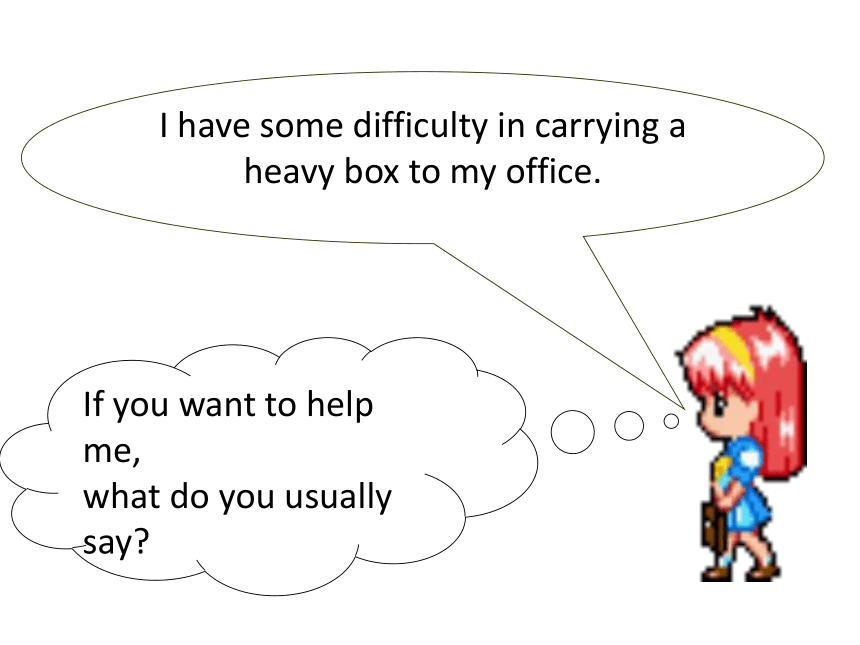
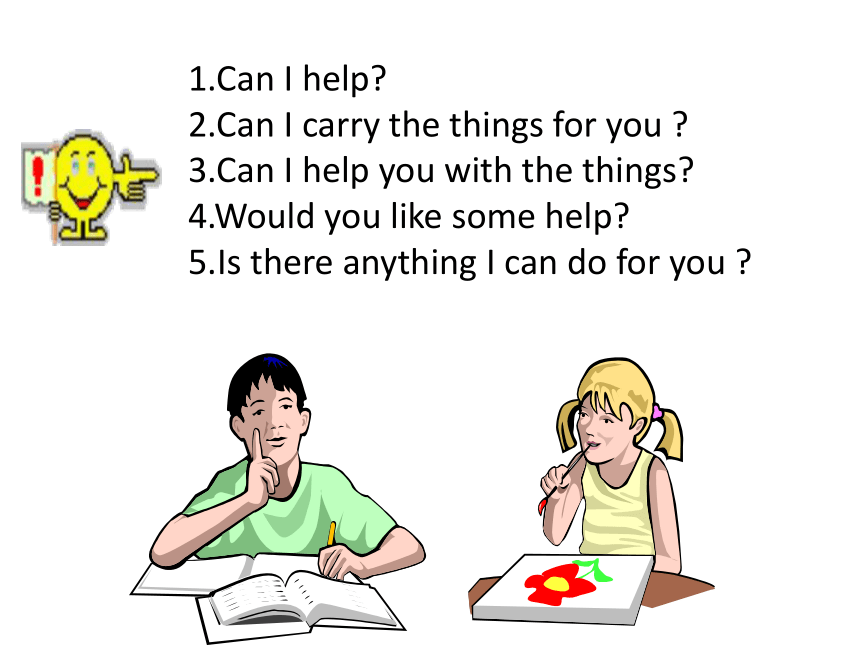
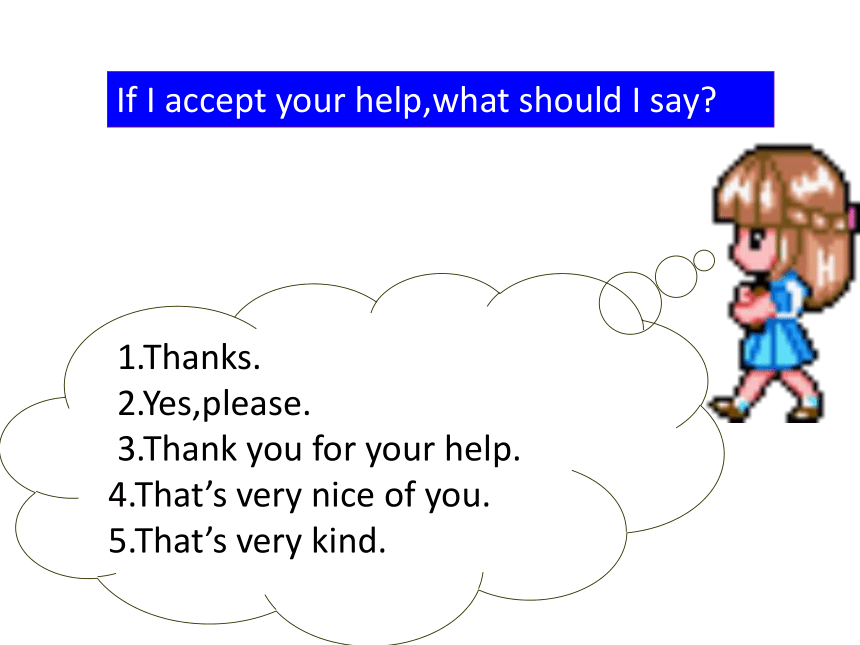
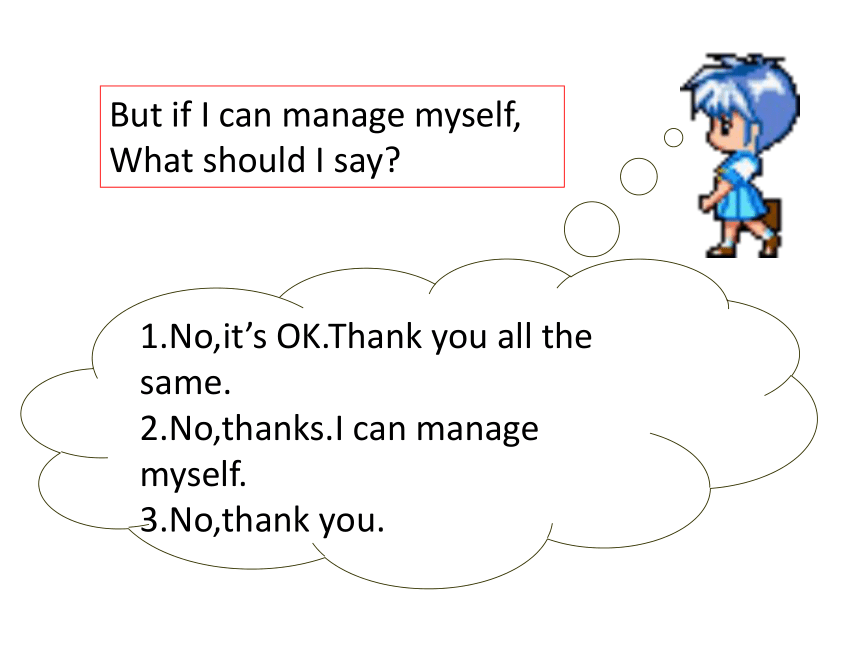
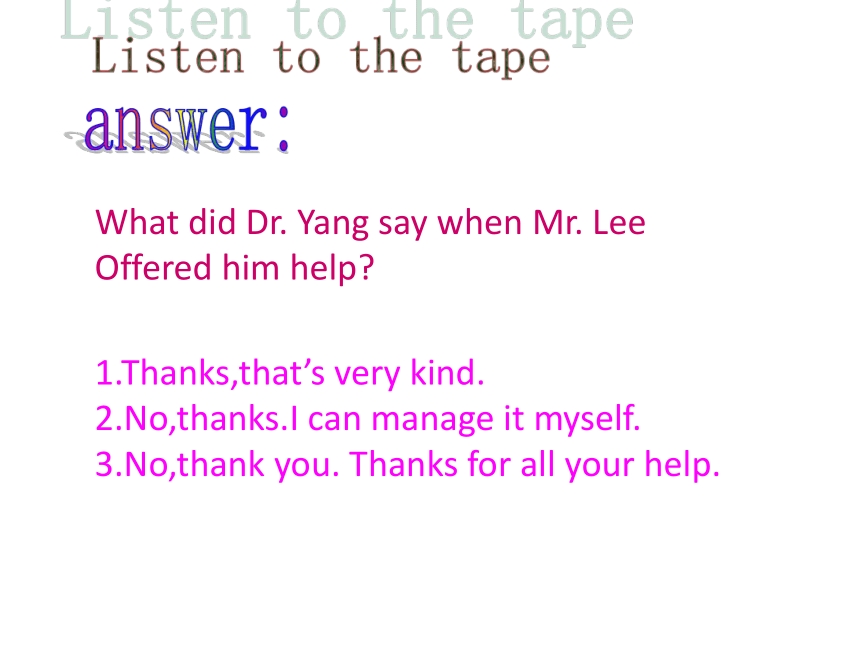
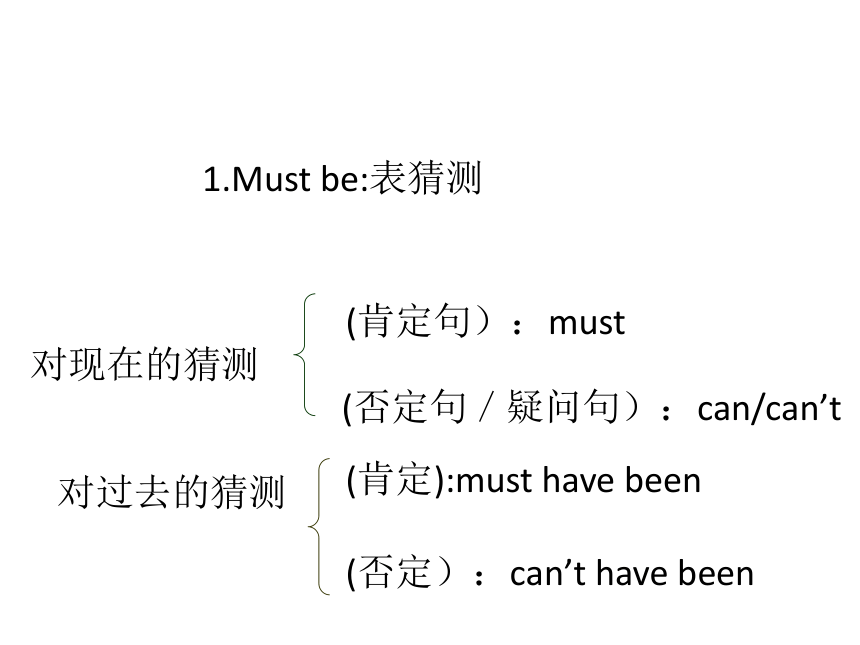
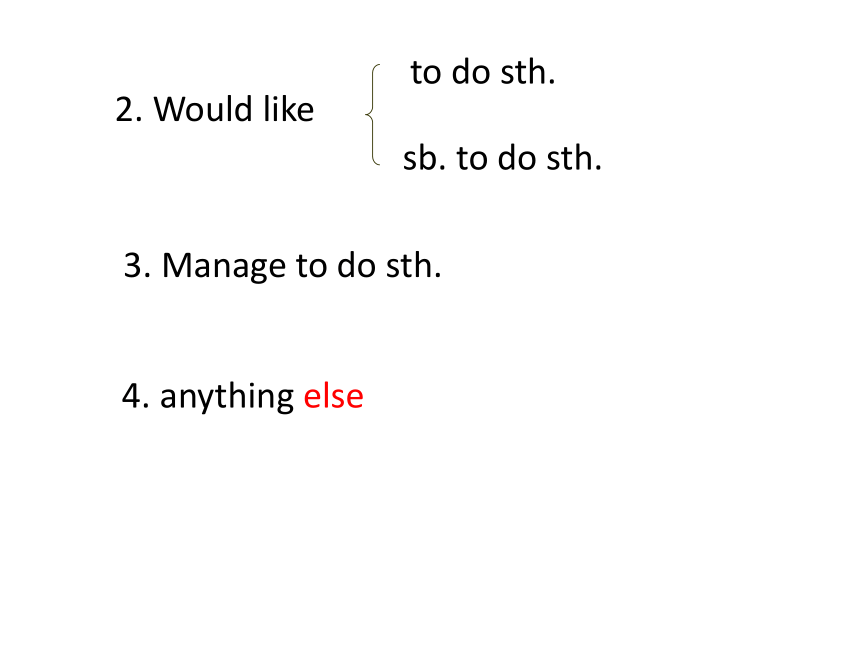
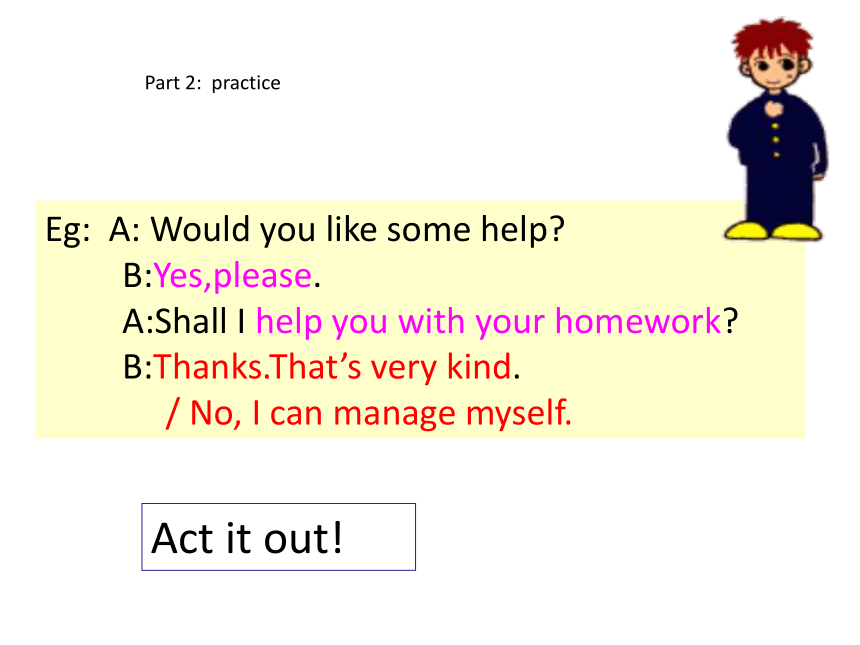
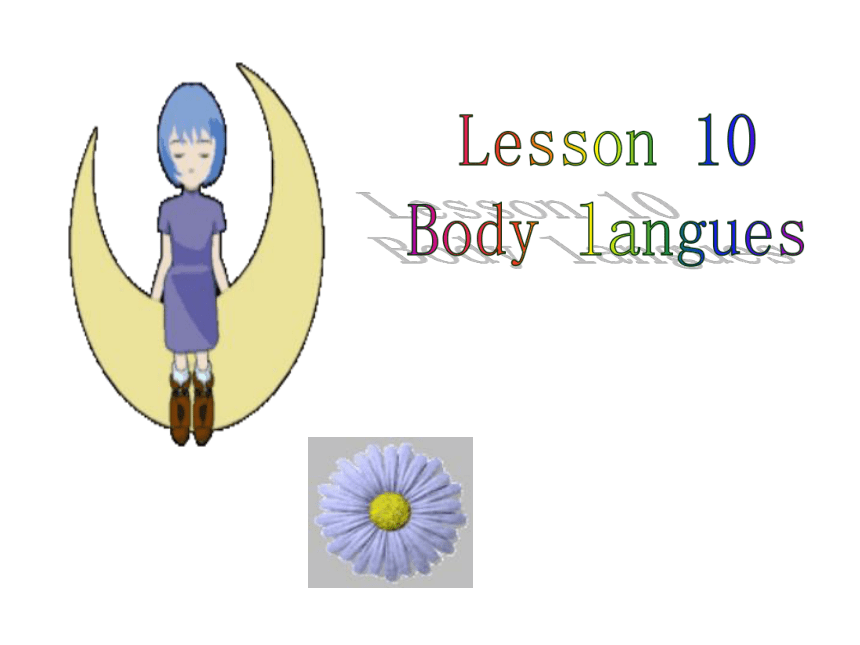

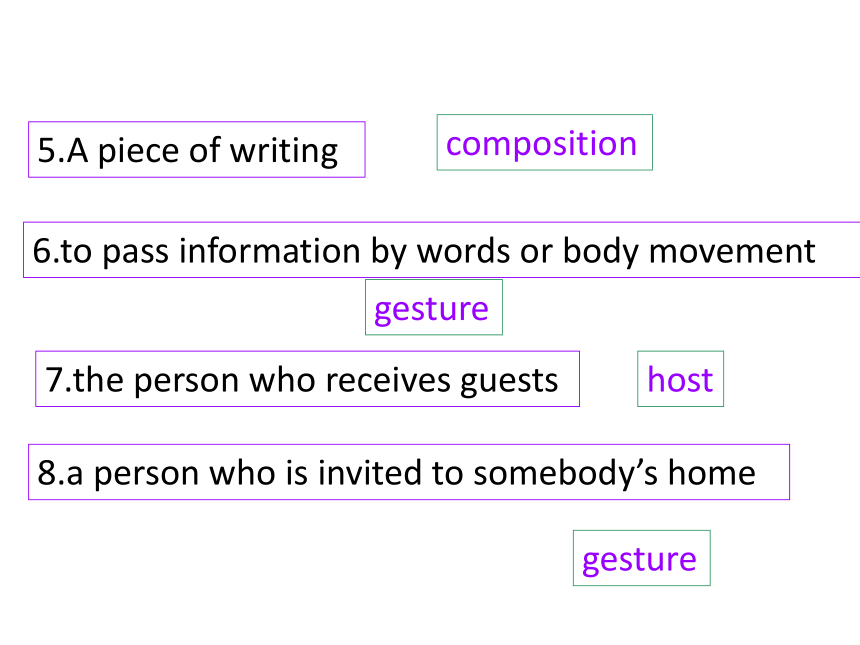
文档简介
Unit 4
Body Langues
I have some difficulty in carrying a heavy box to my office.
If you want to help me,
what do you usually say?
1.Can I help?
2.Can I carry the things for you ?
3.Can I help you with the things?
4.Would you like some help?
5.Is there anything I can do for you ?
If I accept your help,what should I say?
1.Thanks.
2.Yes,please.
3.Thank you for your help.
4.That’s very nice of you.
5.That’s very kind.
But if I can manage myself,
What should I say?
1.No,it’s OK.Thank you all the same.
2.No,thanks.I can manage myself.
3.No,thank you.
What did Dr. Yang say when Mr. Lee
Offered him help?
1.Thanks,that’s very kind.
2.No,thanks.I can manage it myself.
3.No,thank you. Thanks for all your help.
Listen to the tape
answer:
1.Must be:表猜测
(肯定句):must
(否定句/疑问句):can/can’t
对现在的猜测
对过去的猜测
(肯定):must have been
(否定):can’t have been
2. Would like
to do sth.
sb. to do sth.
3. Manage to do sth.
4. anything else
Part 2: practice
Eg: A: Would you like some help?
B:Yes,please.
A:Shall I help you with your homework?
B:Thanks.That’s very kind.
/ No, I can manage myself.
Act it out!
Lesson 10
Body langues
1.To be able to do sth.
manage
2.to “write”with a typewriter
type
3.to understand and believe a fact
realize
4.to move one’s head quickly down and up to show
agreement
nod
guessing words:
5.A piece of writing
6.to pass information by words or body movement
7.the person who receives guests
8.a person who is invited to somebody’s home
composition
gesture
host
gesture
9.hand when tightly(紧紧地)closed as in boxing
fist
10.a movement of the hand or other parts of body
to express a certain meaning
communication
Look at some gesture,guess:
Hello!
success
The last
OK
welcome
The best
NO!
Say hello!
proud
love
Hello!/
Goodbye!/
Hi!
questions:
Paragraph 1:
1.Do people send each other messages
only by words? What other ways can be used?
No.
By expressions and body movements.
1.make sb. done
“使某人被…”
“他不能让别人听到她说话.”
He couldn’t make himself heard.
2.V-ing 充当句中主、表和宾语。
Seeing is believing.
“眼见为实”
He advised going out.
3. accept…as
“承认/认为是…”
+ n./ V-ing
“我们认为她是最好的学生.”
We accepted her as the best student.
She was accepted as the best student.
questions: Paragraph 2
Does all body language mean the same
Thing in different countries?
Not all body language means the same thing.
表部分否定:all,both,everything,whole,
total,always 等与not连用。
Eg: He is not always late.
他并非总是迟到。
4.
全部否定:none,neither,nothing,nobody,
no one, never.
Neither of them is/ are wrong.
他们两都没错。
5. Not…but…
“不是…而是…”
conj.词组
(连接两个并列成分)
Eg:1).He is not Japanese,but Chinese.
表语
2).She can’t speak English,but can write English.
谓语
3).We need not the winner,but the friendship.
宾语
4).Not the boy but the parents want to leave.
主语
Not the parents but the boy wants to leave.
“就近原则”
相似的用法: not only…but also…(连主语)
There be 句型 等。
questions: Paragraph 3
1.In what country do men kiss each other
When they meet?
2.What’s the custom in Britain and France?
Many countries,for example in Russia,France
questions: Paragraph 4
1.Do people from English-speaking countries
Like to touch each other?
2.Which nationality likes to touch each other
Very much?
No.
Puerto Rico.
questions: Paragraph 5
What’s the custom of the Arabs when they
Are eating?
--You eat using the fingers of your right hand,
The left hand is not used at all.
6.V-ing 短语做方式状语
Eg:1)“孩子们用手指来数数”
Children count the number using fingers.
2)They showed disagreement shaking their
heads.
他们摇头表示不同意。
7.with +n.+V-ing
独立主格结构
(表伴随)
Eg:1)他躺在床上,眼睛望着天花板。
He was lying in bed,with his eyes looking
At the ceiling.
2)在导游的带领下,我们参观了兵马俑。
With the tourist leading the way,we visited
The Terra Cotta Warriors.
Bye!
Body Langues
I have some difficulty in carrying a heavy box to my office.
If you want to help me,
what do you usually say?
1.Can I help?
2.Can I carry the things for you ?
3.Can I help you with the things?
4.Would you like some help?
5.Is there anything I can do for you ?
If I accept your help,what should I say?
1.Thanks.
2.Yes,please.
3.Thank you for your help.
4.That’s very nice of you.
5.That’s very kind.
But if I can manage myself,
What should I say?
1.No,it’s OK.Thank you all the same.
2.No,thanks.I can manage myself.
3.No,thank you.
What did Dr. Yang say when Mr. Lee
Offered him help?
1.Thanks,that’s very kind.
2.No,thanks.I can manage it myself.
3.No,thank you. Thanks for all your help.
Listen to the tape
answer:
1.Must be:表猜测
(肯定句):must
(否定句/疑问句):can/can’t
对现在的猜测
对过去的猜测
(肯定):must have been
(否定):can’t have been
2. Would like
to do sth.
sb. to do sth.
3. Manage to do sth.
4. anything else
Part 2: practice
Eg: A: Would you like some help?
B:Yes,please.
A:Shall I help you with your homework?
B:Thanks.That’s very kind.
/ No, I can manage myself.
Act it out!
Lesson 10
Body langues
1.To be able to do sth.
manage
2.to “write”with a typewriter
type
3.to understand and believe a fact
realize
4.to move one’s head quickly down and up to show
agreement
nod
guessing words:
5.A piece of writing
6.to pass information by words or body movement
7.the person who receives guests
8.a person who is invited to somebody’s home
composition
gesture
host
gesture
9.hand when tightly(紧紧地)closed as in boxing
fist
10.a movement of the hand or other parts of body
to express a certain meaning
communication
Look at some gesture,guess:
Hello!
success
The last
OK
welcome
The best
NO!
Say hello!
proud
love
Hello!/
Goodbye!/
Hi!
questions:
Paragraph 1:
1.Do people send each other messages
only by words? What other ways can be used?
No.
By expressions and body movements.
1.make sb. done
“使某人被…”
“他不能让别人听到她说话.”
He couldn’t make himself heard.
2.V-ing 充当句中主、表和宾语。
Seeing is believing.
“眼见为实”
He advised going out.
3. accept…as
“承认/认为是…”
+ n./ V-ing
“我们认为她是最好的学生.”
We accepted her as the best student.
She was accepted as the best student.
questions: Paragraph 2
Does all body language mean the same
Thing in different countries?
Not all body language means the same thing.
表部分否定:all,both,everything,whole,
total,always 等与not连用。
Eg: He is not always late.
他并非总是迟到。
4.
全部否定:none,neither,nothing,nobody,
no one, never.
Neither of them is/ are wrong.
他们两都没错。
5. Not…but…
“不是…而是…”
conj.词组
(连接两个并列成分)
Eg:1).He is not Japanese,but Chinese.
表语
2).She can’t speak English,but can write English.
谓语
3).We need not the winner,but the friendship.
宾语
4).Not the boy but the parents want to leave.
主语
Not the parents but the boy wants to leave.
“就近原则”
相似的用法: not only…but also…(连主语)
There be 句型 等。
questions: Paragraph 3
1.In what country do men kiss each other
When they meet?
2.What’s the custom in Britain and France?
Many countries,for example in Russia,France
questions: Paragraph 4
1.Do people from English-speaking countries
Like to touch each other?
2.Which nationality likes to touch each other
Very much?
No.
Puerto Rico.
questions: Paragraph 5
What’s the custom of the Arabs when they
Are eating?
--You eat using the fingers of your right hand,
The left hand is not used at all.
6.V-ing 短语做方式状语
Eg:1)“孩子们用手指来数数”
Children count the number using fingers.
2)They showed disagreement shaking their
heads.
他们摇头表示不同意。
7.with +n.+V-ing
独立主格结构
(表伴随)
Eg:1)他躺在床上,眼睛望着天花板。
He was lying in bed,with his eyes looking
At the ceiling.
2)在导游的带领下,我们参观了兵马俑。
With the tourist leading the way,we visited
The Terra Cotta Warriors.
Bye!
同课章节目录
